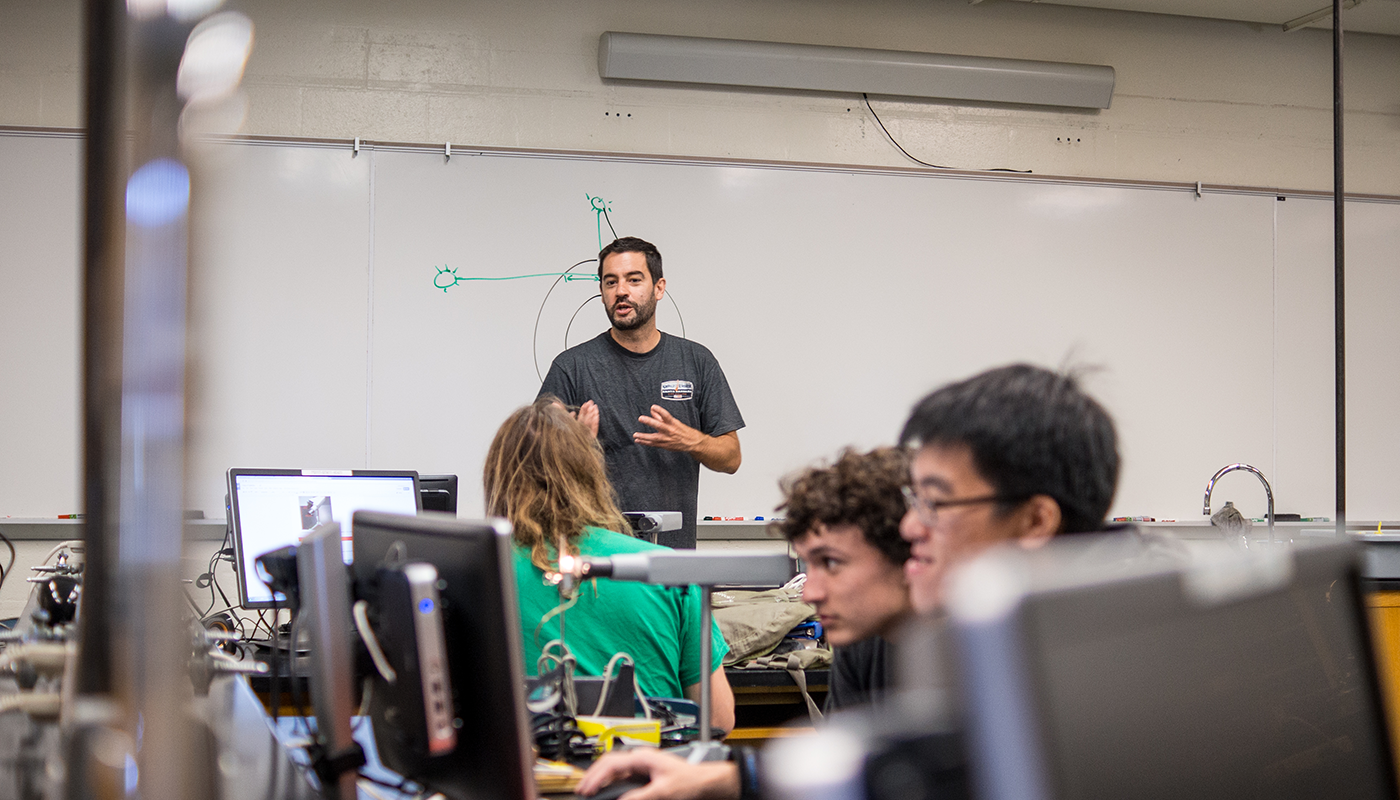
Physics and Engineering
Physics Program Description
Physics is the foundation discipline which must be incorporated into the education of anyone preparing for a career in engineering or science. It is equally true for the non-scientist having the responsibility to make meaningful decisions in society - the citizen in politics, the business person or social scientist who deals with problems of a society strongly linked to technology based on application of physical principles. A truly educated person preparing for life in the 21st century can hardly afford not to be aware of the statements of contemporary physics.
The Physics Department, in addition to offering courses for the major, provides a support service in offering Physics courses satisfying the needs of other disciplines.
There is a three-semester, calculus-based sequence (PHYS 121, 122, 123) for the student in Engineering, Physics and other physical sciences. The department also offers the Excellence in Mathematics, Sciences and Engineering (EMSE) workshop program (PHYS 121W, 122W, and 123W) to assist students in calculus-based Physics courses.
For the Biological Sciences student, both a two-semester trigonometry-level Physics sequence (PHYS 105 and 106) and a two-semester calculus-level Physics sequence (PHYS 110 and 111) are offered.
PHYS 102 satisfies the needs of those requiring an introduction to physics prior to entering the Engineering/Physics sequence.
For those fulfilling a General Education science requirement, a one-semester general survey Physics course (PHYS 101 and 101L) is offered.
To satisfy the needs of the Liberal Studies major, the Physics Department offers a non-mathematical one-semester Physical Science course (Physical Science 103) which covers the physical basis of a number of disciplines-Physics, Chemistry, Astronomy, Geology and Meteorology.
The department offers an AS-T Degree in Physics for Transfer. This degree provides the foundational knowledge in physics to students who want to earn a Baccalaureate Degree in Physics. This degree is in compliance with the Student Transfer Achievement Reform Act {Senate Bill 1440, now codified in California Education Code Sections 66746-66749} and guarantees admission to a California State University (CSU) campus for any community college student who completes an “associate degree for transfer,” a newly established variation of the associate degrees traditionally offered at a California community college. Upon completion of the transfer associate degree, the student is eligible for transfer with junior standing into the California State University (CSU) system. Students will be given priority consideration when applying to a particular program that is similar to the student’s community college area of emphasis. For more information on transfer degrees, visit www.sb1440.org.
Student Learning Outcomes
-
Demonstrate proficiency, both conceptually and mathematically with calculus, in solving mechanical static and dynamic mechanical problems involving both solids and fluids.
-
Demonstrate proficiency, both conceptually and mathematically with calculus, in solving mechanical wave problems.
-
Demonstrate proficiency, both conceptually and mathematically with calculus, in solving thermodynamic problems.
-
Demonstrate proficiency, both conceptually and mathematically with calculus, in solving electric, magnetic and electromagnetic problems.
-
Demonstrate proficiency, both conceptually and mathematically with calculus, in solving ray and wave optics problems.
-
Demonstrate proficiency, both conceptually and mathematically with calculus, in solving modern physics problems.
-
Demonstrate proficiency in construction and assembly of experimental apparatuses; conduct and analyze measurements of physical phenomena; assess experimental uncertainty; make meaningful comparisons between experiment and theory; and interpret results.
Engineering Program Description
Engineering involves the application of science, mathematics and technology to solve and analyze a wide range of problems. In today's society, engineering specialties include civil, electrical, mechanical, chemical, materials, industrial, aeronautical, environmental and computer engineering, among others. In general, engineers participate in the activities which make the resources of nature available in a form beneficial to society and provide systems which will perform optimally and economically.
The engineering transfer program at Santa Barbara City College provides lower-division engineering course work equivalent to the first two years of education at a 4-year university leading to a Bachelor of Science Degree. At Santa Barbara City College, all engineering transfer students major in Engineering and do not declare a specific branch of engineering study until after they have transferred to a 4-year university. An Associate in Science and an Associate in Arts may also be obtained.
Program Student Learning Outcomes
- Knowledge of the engineering profession, and the engineering analysis and design process.
- Utilize mathematical analysis and graphical methods to solve engineering problems.
- Demonstrate proficiency in the application and use of engineering software and laboratory equipment.
- Develop teamwork and technical writing skills to be successful on an engineering design team.
Faculty and Offices
Michael Young, Chair (PS-119, ext. 4497)
Doug Folsom (PS-115, ext. 4305)
Hector Gamero-Jauregui (ext. 4253)
Amy Swearngin (PS-113, ext. 4126)
Ron Ferril, Laboratory Technician (PS-120, ext. 4112)
Jens-Uwe Kuhn, Dean (A-113, ext. 4339)